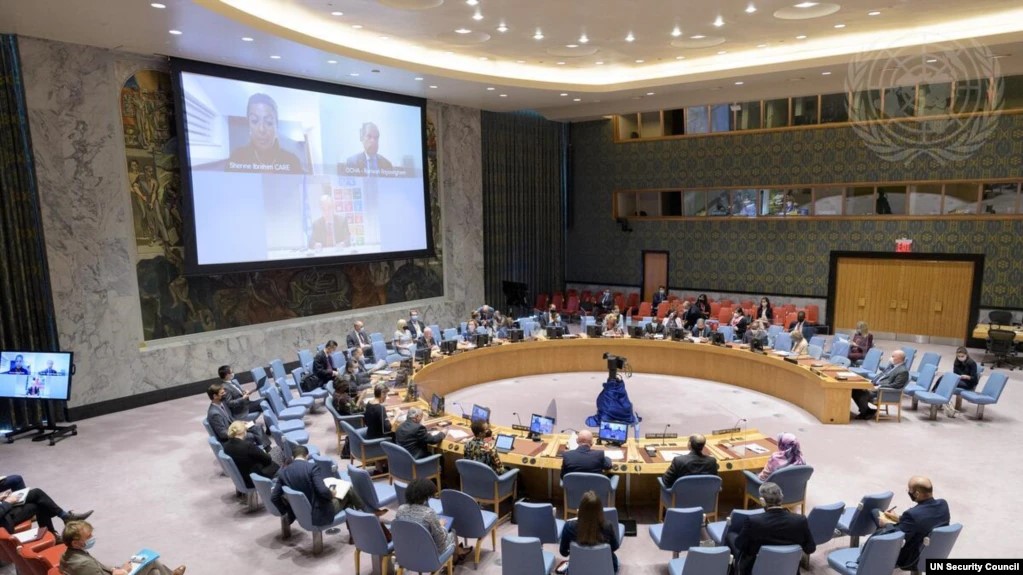The Secretary-General’s Special Representative for Afghanistan Deborah Lyons briefed the United Nations Security Council (UNSC) on Thursday – September 9 – and described the situation in Afghanistan as “grim” and called for UN engagement to “shape the new reality.”
Lyons said the people of Afghanistan have faced a new and worrying reality since August 15 when the Taliban took control of Kabul.
Lyons said the Taliban have taken power, but they have not gained the confidence of the people of Afghanistan, evidenced by thousands trying to flee the country and protests around the country.
“These scenes, watched around the world, have now been replaced by scenes of protest around the country. They show that the Taliban have won power, but not yet the confidence of all Afghan people,” Lyons said.
Lyons also said the new cabinet announced by the Taliban is exclusive, contrary to the Taliban’s promises to form an inclusive government.
“Those who hoped for, and urged for, inclusivity will be disappointed. There are no women in the names listed. There are no non-Taliban members, no figures from the past government, nor leaders of minority groups. Instead, it contains many of the same figures who were part of the Taliban leadership from 1996 to 2001,” she added.
The Taliban made a statement about their appointments of acting ministers: “The Islamic Emirate considered it necessary to immediately form a cabinet using the cadres of the Islamic Emirate,” Anaamullah Samangani, a member of Taliban’s cultural commission said.
Lyons said the Taliban should create an Afghanistan where no one will be living in fear and the talented should be allowed to participate in government and women and girls should enjoy their full freedom and inclusion.
Lyons also referred to some of the members of the cabinet that are on the UN sanction list and urged the UNSC to consider how to deal with the sanction list:
“What is of immediate and practical importance to those around this table is that of the 33 names presented, many are on the United Nations sanctions list, including the prime minister, the two deputy prime ministers, and the foreign minister. All of you will need to decide which steps to take regarding the sanctions list, and the impact on future engagement,” said Lyons.
On Thursday, the Taliban spokesman Zabihullah Mujahid tweeted a statement referencing the fact that Taliban leaders now appointed to the caretaker government of Afghanistan were on US blacklists, calling this a violation of the US-Taliban agreement:
“Pentagon officials have remarked that some cabinet members of the Islamic Emirate or family members of late Haqqani Sahib” are “on the US blacklists and still targets” and “the Islamic Emirate considers this position a clear violation of the Doha Agreement”
Lyons also highlighted that the humanitarian crisis is worsening, saying that millions of Afghans are in desperate need of help and that practical steps should be taken immediately to address the worsening crisis.
“We must focus on the pre-existing humanitarian crisis, mostly in rural areas, that is indeed worsening as we speak. Addressing this crisis cannot wait for political decisions regarding the removal of sanctions,” she added.
According to Lyons, considering the Taliban members on UN sanctions list, the humanitarian aid to the Afghans should be provided either through the UN or NGOs.
She said the freezing of billions of dollars worth of funds intended for the country’s relief and development will take the Afghan economy into a deep crisis. The “inevitable effect … will be a severe economic downturn that could throw many more millions into poverty and hunger” and “may generate a massive wave of refugees from Afghanistan, and indeed set Afghanistan back for generations,” she said.
She also raised concerns over the growing prices of food and fuel, the inability of private banks to pay out people’s deposits and the inability of Afghans to finance imports of food, medicine, fuel, electricity and other essential items. Lyons urged that mechanisms be found that would allow money to flow into Afghanistan to prevent a total breakdown of the economy of the country.
Lyons also said the incidents of harassment and intimidation against the UN Afghan staff are growing, and said the UN in Afghanistan will do anything to keep them safe.
Although the Taliban have announced a general amnesty, Lyons said there have been credible allegations of killings of Afghan forces and civil servants of the former administration by Taliban forces.
“We are also concerned that despite the many statements granting general amnesties to ANDSF personnel and those who have worked as civil servants, there have been credible allegations of reprisal killings of ANDSF personnel, and the detention of officials who worked for previous administrations. We have received reports of members of the Taliban carrying out house-to-house searches and seizing property, particularly in Kabul,” she added.
According to Lyons, the Taliban have also failed to keep their promises about respecting the rights of women, saying the UN has received reports that the Taliban have prohibited women from appearing in public. She also said the Taliban have used violence against women. She said: “We are also extremely disturbed at the increasing violence used against Afghans who are protesting Taliban rule.”
Despite this, Lyons said, the UN should become engaged in Afghanistan and shape the new reality in a positive way. According to her, the Taliban needs international assistance and this makes the engagement easier.
“In our initial engagements with Taliban leaders over this past year and in most recent weeks, we have received a clear message that they need and want international assistance. Some indeed have asked for patience and even advice as they attempt to transition from a military insurgency to a government,” she added.
Lyons also said the impact of the latest developments goes beyond Afghanistan’s borders, and that many neighboring countries of Afghanistan are apprehensive about how the Taliban will govern.
Massive migrations, the flow of drugs, and Al Qaida’s reemergence are the main concerns of neighboring countries, she said.
“Al Qaeda members remain in Afghanistan, visibly welcomed and sheltered by the de facto Taliban authorities. Islamic State Khorasan Province remains active and could gain strength,” she added.
She also said the UN will remain in Afghanistan to help the people of Afghanistan and will work with other parties for the resumption of civilian flights from Kabul airport.











